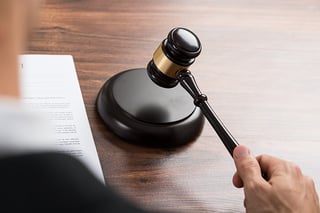Scura, Wigfield, Heyer, Stevens & Cammarota Blog
- Blog
Avoiding Judicial Liens
 Generally, a lien will pass through a bankruptcy unaffected, that is, unless it is specifically avoided. If competent bankruptcy counsel is not retained, an unsuspecting debtor may think that they are completely free from the burden of a lien by simply obtaining a bankruptcy discharge. Unfortunately, if the lien is not specifically avoided, the creditor will still have an in rem claim against the property of the debtor. That is to say that a bankruptcy discharge only relieves the debtor of the personal liability for a debt. In sum, lien avoidance is not automatic, and the debtor (through counsel) has the burden of avoiding liens under 11 U.S.C. §522(f).
Generally, a lien will pass through a bankruptcy unaffected, that is, unless it is specifically avoided. If competent bankruptcy counsel is not retained, an unsuspecting debtor may think that they are completely free from the burden of a lien by simply obtaining a bankruptcy discharge. Unfortunately, if the lien is not specifically avoided, the creditor will still have an in rem claim against the property of the debtor. That is to say that a bankruptcy discharge only relieves the debtor of the personal liability for a debt. In sum, lien avoidance is not automatic, and the debtor (through counsel) has the burden of avoiding liens under 11 U.S.C. §522(f).
What is a Judicial Lien?
A judicial lien is defined by 11 U.S.C. §101(36) of the Bankruptcy Code as any lien “obtained by judgment, levy, sequestration, or other legal or equitable process or proceeding.” In order to avoid a lien, the lien must become a judgment and the debtor must actually have an interest in that property at the time the judgment becomes a lien. In New Jersey, under N.J.S.A. §2A:16-1 and N.J.S.A. §2A17-17, once the judgment is recorded with the Clerk of the Superior Court, it becomes a lien on all of the debtor’s real property that is located in the State of New Jersey.
How to Determine if the Lien can be Avoided
In order to avoid a lien, the lien must impair an exemption. The debtor’s exemptions are listed in 11 U.S.C. §522(d) and the amounts are adjusted every few years. The amount of the exemptions, and value of the property, are determined as of the date the bankruptcy petition is filed. 11 U.S.C. §522(a)(2). Section 522(f) advises when a lien impairs a debtor’s exemption. “[A] lien shall be considered to impair an exemption to the extent that the sum of (i) the lien; (ii) all other liens on the property; and (iii) the amount of the exemption that the debtor could claim if there were no liens on the property; exceeds the value that the debtor’s interest in the property in the absence of any liens.” 11 U.S.C. §522(f)(2)(A). In a case where the lien only partially impairs a debtor’s exemption, the judgment lien can become fixed (and reduced) to the amount above the impairment. The amount that impairs the exemption will become avoided.
Procedure to Avoid the Lien
A judgment lien is avoided by motion practice in a Chapter 7 and Chapter 11 bankruptcy proceeding. Federal Rules of Bankruptcy Procedure 4003(d). The motion is filed, with notice to affected creditors, and an opportunity for a hearing (if an objection is filed). In a Chapter 13 bankruptcy, the form Chapter 13 Plan contains a motions section where a judicial lien can be avoided. There are separate rules and procedures for removing subordinate mortgage liens, which will be discussed further in another blog post.
Conclusion
Retaining a competent bankruptcy attorney is crucial to ensure that your case is properly handled and you take advantage of all the bankruptcy process has to offer. If your case is not handled properly the first time, you are sure to incur further fees to fix it down the road. With that said, if you previously filed a case and there were liens that were not avoided, please give us a call.
Share Article
Need Help? Contact Us Today!





Lists by Topic
- Bankruptcy (323)
- Personal Injury (95)
- Chapter 13 (52)
- Chapter 7 (51)
- Debt Management (50)
- Foreclosure (47)
- Accident (32)
- Car Accident (27)
- Chapter 11 (25)
- Business Bankruptcy (20)
- Insurance Claims (19)
- Credit (18)
- Business Law (13)
- Employment Law (12)
- Litigation (12)
- Probate and Estate Law (11)
- Damages (10)
- Medical (10)
- Product Liability (10)
- Workers Compensation (10)
- Attorney (9)
- Consumer Bankruptcy (9)
- Commercial & Residential Real Estate (6)
- Slip and Fall (6)
- Contracts (5)
- Premises Liability (5)
- Repossession (5)
- wrongful death (5)
- Video | Bankruptcy (4)
- Bankruptcy Cost (3)
- Corporate Litigation (3)
- Trial Law (2)
- student loans (2)
- tax (2)
- Attorney Fees (1)
- COVID-19 (1)
- Certified Civil Trial (1)
- Dog Bites (1)
- News (1)
- Relocation Assistance (1)

